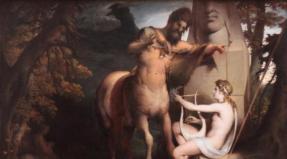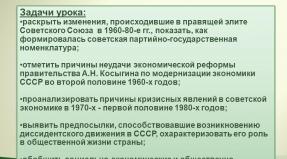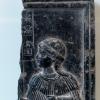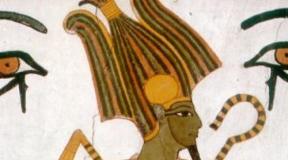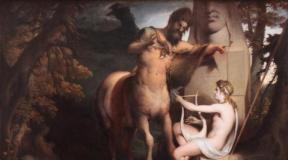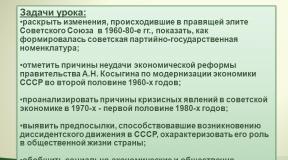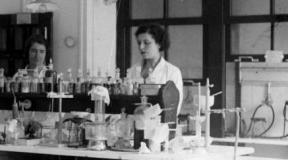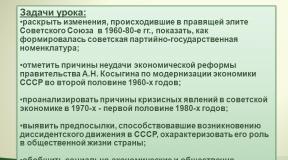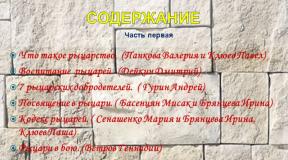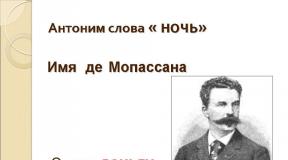Achilles is a hero of ancient Greek mythology. Comparative characteristics of the images of Achilles and Hector Meeting with the Amazon
Achilles is one of the most complex figures in all ancient literature. In the first stage of his tragedy, when he is in a quarrel with Agamemnon, he behaves rather passively. His action here is mainly “anger” against his offender. In Achilles, first of all, from the very beginning - enormous destructive power, bestial revenge, thirst for blood and cruelty. But, on the other hand, the whole point of this blood, this atrocity lies in friendship with Patroclus, because of whom he starts this whole massacre. The image of a beloved friend lives along with bestial rage and inhumanity. It is very characteristic of Achilles, for example, that after the appearance of the ditch in a wild and ferocious form and after the panic caused by his terrible cry among his enemies, he sheds “hot tears” over the corpse of his faithful comrade. In addition, Homer’s Achilles is generally characterized by soft and gentle features, which should not be forgotten when characterizing him. He is pious and often turns to the gods (libation and prayer to Zeus for Patroclus entering the battle), he is restrained, for example, when dealing with the messengers of Agamemnon, considering them completely innocent, he is struck by the fire that started on the Greek ships, he is loving a son who often turns to his mother and cries around her, as, for example, after an insult received from Agamemnon or after the news of the death of Patroclus. This antithesis is the most characteristic feature of Achilles. On the one hand, he is angry, quick-tempered, vindictive, merciless in war, he is a beast, not a man, so Patroclus is quite right in telling him
You are cruel at heart. Your father was not Peleus the horse-wrestler,
Mother is not Thetis the goddess. You were born by the sparkling sea.
A solid rock - they make you have a hard heart.
However, this is how he reacts to the death of his friend:
A black cloud of sorrow covered Peleus' son.
Taking a handful of smoky ashes with both hands,
He sprinkled it on his head, making his beautiful appearance ugly.
He stained his entire fragrant tunic with black ash,
He himself, large, stretched out in a large space, lay
In the gray dust and tormented his hair, disgracing it.
This antithesis of a stern fighter and a tender heart is the main thing we find in Achilles.
Achilles' experience coincides with the dictates of fate and his own turbulence of life. He knows that he will not return from Troy, and nevertheless, he undertakes a difficult and dangerous campaign. Before a decisive battle, the horses predict his imminent death, destined by fate, but this does not stop him at all:
Why are you, Xanth, prophesying death for me? It's not your concern!
I know well that fate is destined for me to die
Here, far from father and mother. But I won't get off
From the battle, until the Trojans have had their fill of war!
Achilles has secret knowledge, a secret vision of his destiny.
Hector. The main rival of a great hero, so he himself must be great. Hector defends his homeland, the land. Charming image of a person. High level of responsibility. Actually, Hector is an opponent of the Trojan War. He wants to save his city. A supporter of a peaceful resolution of the conflict - offers to pay military costs, return Helen and treasures to the Greeks.
But hostile, evil forces amuse their pride and interfere with Hector. Every day a hero fearlessly goes into battle. Priam is old, Paris is tender. Hectonre fights Diomedes and Ajax.
Hector smashes the gates of the Greek camp with a stone, sets fire to the ships, and begins to fight Patroclus.
Associated with peaceful life. The joy of being is love for his son and Andromache. Perhaps the most lyrical scene of the Iliad is Hector’s meeting with Andromache. Andromache is from a neighboring tribe; all her relatives were killed by Achilles. She begs her husband not to leave. But G cannot hide within the walls of Troy; for him, protecting the city is a duty, and hiding is a shame. Hector's meeting with his son is a subtle psychological scene.
Good Elena has never heard an evil word from him; she values him most of all.
But, unlike Achilles, Hector is an ordinary person. The body of Achilles cannot be struck by a mortal hand. In single combat, unequal forces collide, demon and man. A scene that amazes the inner state of a person, because literature was still undeveloped for depicting the inner world. Psychologism is expressed through action - Hector’s heart becomes infected with fear. Moreover, only Zeus decides who will win, and Athena helps Achilles.
The cruelty of Achilles - Hector asks him to bury him, give away his body, and the “hero” mocks the corpse.
Homer argues in the image of Hector that all people are destined to suffer from violence.
The strong do not think about killing. For every strength there is a greater strength. The idea of retribution for those who abuse force is the idea of the entire group. Literary
Justice and love have no place on the battlefield.
Hector is opposed to Achilles.
Achilles is godlike and godlike. Without his participation, Troy cannot fall. The ideal warrior of the heroic epic. With just his ferocious appearance, he drives the Trojans away from the body of Patroclus and, taking revenge, kills so many enemies that the water in the river turns into blood. Bloodthirsty, does not know mercy and kindness. In the same battle he kills 12 sons of Priam. “I drove justice out of my thoughts.” Kills many captives at the tomb of Patroclus. Individualism and heightened pride, touchiness.
Only the death of a friend motivates Achilles to fight. Coldness and passion, sentimentality and bloodthirstiness - Achilles dreams only of personal glory and is ready to give his life for this.
Hero of Troy. If the name of Achilles opens the poem, the name of Hector ends it. “So they buried the body of the horseman Hector.”
Hector’s character is striking in its deep integrity; for him, the most important thing is to fight for his homeland and for his people. For all his religiosity, which Homer emphasizes more than once, he prefers military exploits. He is not afraid to admit his military mistakes and covers them up with his heroism.
Burning with a passion for military exploits, he, contrary to the advice of his elders, sent his troops against Achilles and did not take them to Troy, although his own death and the death of many Trojans was obvious. Consciousness of his duty, shame in front of his compatriots in the event of his betrayal, the habit of fighting in the front ranks - these thoughts come to him even when parting with Andromache (he passionately loves her, but duty is above all else for him).
When the superbly armed Ajax appears, Hector’s heart trembles. But he does not even think about avoiding the fight or fighting in some dishonest way, without attacking openly and nobly. The wound to the neck and knees not only does not stop him, but also provokes him even more. However, for all his heroism and for all his integrity, Hector is depicted in Homer with all the psychological weaknesses, hesitations and uncertainty. Hector thinks that it will cost nothing to capture the golden shield of Nestor and the colorful shell of Diomedes, made by Hephaestus himself. But, of course, nothing comes of this.
He is so confident in his victory over the Achaeans that he is ready to compare himself with Apollo and Pallas Athena, although he himself knows very well that it is not the Achaeans who must perish, but Troy. It’s strange that when he saw Achilles, he suddenly began to run away so that he ran around three times (internal vibrations). Hector's tragedy is terrible. Having met Achilles after the chase, he is not at all lost and courageously enters into a duel. However, he very quickly becomes convinced that he was deceived by Pallas Athena and that he was left alone by Defiob, in whose image the goddess appeared. However, even earlier, Homer proclaims: “Hector was shackled with disastrous fate, and he was left alone there, near the Scaean Gate, in front of the strong city wall.” He, who always had so much hope in the gods, is now convinced of their cunning and treachery and utters words that are full of both courage and despair:
Woe is me! To death, as I see it, the gods are calling me!
I believed that the hero Deiphobus was near me,
He's inside, behind the wall, and Athena deceived me!
Ominous death is now close before me, not far away!
But if Hector’s fate is touching, then his end is filled with pity and compassion. A request addressed to the brutal enemy that he, Hector, should not be given over to dogs to be eaten after death, but buried according to the customs of antiquity, and then Achilles’ nine-day desecration of Hector’s corpse.
So, Homer’s Hector: a selfless leader for his people, an ardent patriot and a fearless soldier, a naive, indecisive and not always successful commander, an overly arrogant, boastful man, a gentle family man, a hero who knows his fatal destiny and nevertheless openly goes into battle , strong-willed and doomed, deceived by the gods, a pitiful and sorrowful victim of enemy atrocities and a man who has lost absolutely everything: his homeland, his family, and his own life.
In the first stage of his tragedy, when he is in a quarrel with Agamemnon, he behaves rather passively. His action here is mainly “anger” against his offender (...Wrath, goddess, sing Achilles...). In the first line it becomes clear what the story is about. For the first 17 chapters, A. did not participate in battles because of resentment and “anger.”
The image of a strong, invulnerable (tell a legend) person, a hero. In Achilles, first of all, from the very beginning - enormous destructive power, bestial revenge, thirst for blood and cruelty. (Tied Hector's body to horses - cruelty. But, apparently, tradition). But, on the other hand, the whole point of this blood, this atrocity lies in friendship with Patroclus, because of whom he starts this whole massacre. The image of a beloved friend lives along with bestial rage and inhumanity. It is very characteristic of Achilles, for example, that after the appearance of the ditch in a wild and ferocious form and after the panic caused by his terrible cry among his enemies, he sheds “hot tears” over the corpse of his faithful comrade. In addition, Homer’s Achilles is generally characterized by soft and gentle features, which should not be forgotten when characterizing him. He is pious and often turns to the gods (libation and prayer to Zeus for Patroclus entering the battle), he is restrained, for example, when dealing with the messengers of Agamemnon, considering them completely innocent, he is struck by the fire that started on the Greek ships, he is loving a son who often turns to his mother and cries around her, as, for example, after an insult received from Agamemnon or after the news of the death of Patroclus. This antithesis is the most characteristic feature of Achilles. On the one hand, he is angry, hot-tempered, vindictive, merciless in war, he is a beast, not a man, so Patroclus is quite right in telling him
You are cruel at heart. Your father was not Peleus the horse-wrestler,
Mother is not Thetis the goddess. You were born by the sparkling sea.
A solid rock - they make you have a hard heart.
However, this is how he reacts to the death of his friend:
A black cloud of sorrow covered Peleus' son.
Taking a handful of smoky ashes with both hands,
He sprinkled it on his head, making his beautiful appearance ugly.
He stained his entire fragrant tunic with black ash,
He himself, large, stretched out in a large space, lay
In the gray dust and tormented his hair, disgracing it.
This antithesis of a stern fighter and a tender heart is the main thing we find in Achilles.
Achilles' experience coincides with the dictates of fate and his own turbulence of life. He knows that he will not return from Troy, and nevertheless, he undertakes a difficult and dangerous campaign. Before a decisive battle, the horses predict his imminent death, destined by fate, but this does not stop him at all:
Why are you, Xanth, prophesying death for me? It's not your concern!
I know well that fate is destined for me to die
Here, far from father and mother. But I won't get off
From the battle, until the Trojans have had their fill of war!
Achilles has secret knowledge, a secret vision of his destiny.
Achilles is a hero of ancient Greek mythology, best known for his episode of participation in Homer wrote about this character in his “Iliad.” And although the Iliad is considered an epic work describing the war against Troy, in fact, it is a story about the quarrel between Achilles and It was she who led to the events that decided the outcome of the ten-year siege of the city.
Origin of Achilles
Achilles was a hero. And initially not even thanks to his actions. It’s just that the heroic fate of Achilles was destined already at birth. After all, according to Greek myths, the offspring that appeared as a result of the connection of immortal gods with mortal people became a hero. He himself did not possess immortality, however, he could count on the protection of his heavenly relatives and, as a rule, had outstanding abilities, mainly in combat.
Achilles' mother was the sea nymph Thetis, and his father was Peleus, who reigned over the Myrmidons. Therefore, in the Iliad the hero is often called Pelid (which means son of Peleus). The unusual marriage between an earthly man and an immortal nymph is also explained in myths. Thetis was raised by Hera, and when Zeus tried to seduce the young nymph, she, in gratitude for the care that his legal wife showed her, refused the voluptuous Olympian. As punishment, Zeus married Thetis to a mortal.
Achilles' heel
Time passed and Thetis and Peleus had children. To check whether they were immortal or not, Thetis dipped the newborn into a cauldron of boiling water. This is how the first six sons died. The seventh was Achilles. It was his father who saved him from the unenviable fate of his brothers, taking his son away from his wife in time. After this, Thetis leaves her husband and returns to live at the bottom of the sea. But she continues to closely monitor her son's life.
According to another myth, Thetis lowered little Achilles into the waters of the sacred Styx, flowing in the kingdom of Hades. This gave the child invincibility. Only his heel, the place where his mother held him tightly, remained vulnerable. This is where the stable expression “Achilles’ heel” comes from, which conveys the idea of a person’s weak point.
After his wife leaves, Peleus sends his young son to be raised by the centaur Chiron. He feeds him animal bone marrow instead of mother's milk. The boy grows up and diligently learns the science of using weapons. And according to some reports, the art of healing.

Visiting Lycomedes
Chiron, who, among other things, also had the gift of a fortuneteller, tells Thetis that if her son avoids participating in the upcoming Trojan War, then he is destined for a long life. If he goes there, the Greeks will win, but Achilles will die. This prompts Thetis to send her son to another island - Skyros, and hide him among the daughters of King Lycomedes. For greater safety, Achilles lives there dressed in women's clothing.
This behavior seems somewhat unusual for a hero thirsting for immortal glory. However, it is worth remembering that at that time the young man was barely fifteen years old. It was by the time described by Homer in the Iliad that Achilles became a fully formed, experienced warrior. After all, the siege of the impregnable city lasted twenty years. And all this time the Greeks did not sit idle. They attacked nearby cities and ravaged them. In the meantime, it was a young man. Bold, but obedient to the instructions of his divine mother.
Meeting with Odysseus
Meanwhile, a chain of events leads to the gathering of troops for war against Troy. The priest Kalkhant announces that if the son of Peleus does not participate in the campaign, the Greeks will face a crushing defeat. Then the Achaean leaders hastily equip Odysseus and send him after Achilles to the island of Skyros.
Realizing that going against the immortal celestials with brute force is more expensive for himself, Odysseus resorts to cunning. He introduces himself as an ordinary traveling merchant and enters the palace of Lycomedes. Having laid out his goods in front of the king’s daughters, Odysseus places richly decorated weapons among the jewelry.
At the appointed moment, Odysseus’s people, on his orders, sounded the alarm. All the girls scattered, only Achilles was not at a loss. This gave him away. The young man grabbed his weapon and ran towards his imaginary enemies. Declassified by Odysseus, Achilles agrees to join the military campaign and takes with him his beloved friend Patroclus, with whom he grew up together.

Sacrifice of Iphigenia
And now a huge Greek fleet, which now includes a detachment of Myrmidons on fifty warships led by Achilles, advances to Troy. The immortal inhabitants of Olympus also participate in all the unfolding events. Moreover, some of them support the Trojans, and some are on the side of the Greeks. Due to the next tricks of the gods supporting the defenders of Troy, the Greek fleet, immobilized by the lack of a fair wind, stands off the coast of the island of Aulis.
Kalkhant makes another prediction: a fair wind will blow only if Agamemnon, the leader of the Greek army who launched a campaign against Troy, sacrifices his daughter Iphigenia. This did not bother my father. The only problem he saw was how to get the girl to the island? Therefore, messengers are sent to Iphigenia with the message that she has been given as a wife to Achilles and must come to Aulis for the wedding. The description of the portrait of Achilles, the hero of ancient Greek mythology, does not leave her indifferent and the girl arrives on the island for the wedding. Instead, it goes straight to the altar.
One version of this story claims that Achilles himself knew nothing about the insidious plan. And when he found out, he rushed with weapons in his hands to defend the deceived princess. But earlier myths tell that the son of Peleus did not show any sentimentality, because he himself was eager to sail to Troy as quickly as possible. And if the gods demand sacrifices, then who will argue with them? In fairness, it is worth noting that Iphigenia was still saved. True, not a hero, but the one who replaced the girl with a doe.
Meeting with the Amazon
But be that as it may, the sacrifice was accepted, and the Greeks arrived safely at Troy. Thus began a long siege of the impregnable city. As already mentioned, Achilles did not sit idle. He became famous at the very beginning of the war, winning one after another glorious victories over the cities surrounding Troy and nearby islands. According to the son of Priam, who was subsequently killed by Achilles, during this time he did not meet with the daring and successful invader. And Achilles continued to hone his skill with weapons.
In one of the next raids, Achilles enters into battle with the queen of the Amazons, Penticelia, who at that time was hiding on the mainland from the revenge of her fellow tribesmen. After a difficult struggle, the hero kills the queen and, using the end of a spear to pry up the helmet, which hid the entire upper part of her face, throws it off the woman. Struck by her beauty, the hero falls in love with her.

Nearby is one of the Greek warriors - Thersites. According to Homer's unflattering descriptions, a very unpleasant subject. He accuses Achilles of lust for a dead woman and gouges out her eyes with a spear. Without thinking twice, Achilles turns around and kills Thersites with one blow to the jaw.
Briseis and Chryseis
In another campaign, the Greeks capture Briseis, whom Achilles keeps as his concubine. Mythology describes that a young woman is not at all burdened by her position. On the contrary, she is always loving and gentle.
At this time, Agamemnon also enjoys the fruits of the raids. Among other things, he is presented with a beautiful girl, Chryseis, as a share of the spoils. But her father comes to the camp, begging to be allowed to ransom his daughter. Agamemnon mocks him and throws him out in shame. Then the inconsolable father begged Apollo for help, and he sent an epidemic to the Greeks. The same soothsayer Kalkhant explains the cause of the misfortunes and says that the girl must be released. Achilles warmly supports him. But Agamemnon does not want to give in. Passions are running high.
Discord with Agamemnon
In the end, Chryseis is released. However, the vengeful Agamemnon, harboring a grudge, decides to take revenge on Achilles. Therefore, as compensation, he takes Briseis from him. The enraged hero refuses to continue taking part in the war. From this moment, events begin to develop rapidly, as the Iliad describes it. The duel between Achilles and Hector is inexorably approaching. As well as the tragic outcome to which it will lead.
Achilles' inaction

The Greeks suffer defeat after defeat. But the insulted Achilles does not give in to anyone’s persuasion and continues to be inactive. But one day the defenders of Troy pushed their opponents back to the very shore. Then, heeding the persuasion of his friend Patroclus, Achilles agrees for him to lead the Myrmidons into battle. Patroclus asks permission to take his friend's armor and receives it. In the subsequent battle, Hector, the Trojan prince, mistaking Patroclus in the armor of Achilles for the famous hero, kills him. This provokes a duel between Achilles and Hector.
Duel with Hector
Having learned of the death of Patroclus, grief-stricken Achilles intends to take brutal revenge. He rushes into battle and sweeps away all the mighty warriors one by one. The characterization of Achilles that Homer gives him in this episode is the apogee of the hero’s entire life. This was the moment of immortal glory that he had so dreamed of. Single-handedly he turns back his enemies and drives them to the very walls of Troy.

In horror, the Trojans hide behind the strong walls of the city. All except one. Noble Hector is the only one who decides to fight back against the son of Peleus. But even this battle-hardened warrior is horrified at the approach of his furious enemy and takes to flight. Achilles and Hector circled Troy three times before meeting in mortal combat. The prince could not resist and fell, pierced by the spear of Achilles. Tying the corpse to his chariot, Achilles dragged Hector’s body to his camp. And only the genuine grief and humility of Hector’s inconsolable father, King Priam, who came to his camp unarmed, softened the winner’s heart, and he agreed to return the body. However, Achilles accepted the ransom - as much gold as Prince Hector of Troy weighed.
Death of a Hero

Achilles himself dies during the capture of Troy. And this cannot happen without the intervention of the gods. Apollo, disgusted by the disrespect of a mere mortal towards him, invisibly guides the arrow fired by Paris, Hector’s younger brother. The arrow pierces the hero's heel - his only weak point - and turns out to be fatal. But even while dying, Achilles continues to defeat many more Trojans. His body is carried out from the thick of the battle by Ajax. Achilles was buried with all honors, and his bones were placed in a golden urn along with the bones of Patroclus.
Achilles (Achilles) is the main character of the poem, a stern and unforgiving warrior. In response to the insult inflicted on him by Agamemnon, the supreme leader and leader of the Achaean army, which besieged Troy for 10 years, A. refuses to participate in the war. Because of this, the Achaeans suffer one defeat after another. But when the Trojan leader Hector kills A. Patroclus’s friend, A. forgets about his offense and reconciles with Agamemnon. The mighty A., patronized by the goddess Athena, shows miracles of courage on the battlefield and kills Hector in a duel, whose death marks
Final defeat of the Trojans. A.'s image bears the typical features of a mythological epic hero, a courageous warrior, in whose value system the most important thing is military honor. Proud, hot-tempered and proud, he participates in the war not so much in order to return the king of Sparta Menelaus his wife Helen, kidnapped by Paris (this was the reason for the war with Troy), but rather in order to glorify his name. A. thirsts for more and more new exploits that will strengthen his glory as an invincible warrior. He sees the meaning of his life in constantly risking his life. A. despises a quiet life at home and prefers death in battle to a serene old age.
(No Ratings Yet)
- The plots of Homer’s famous poems “Iliad” and “Odyssey”, which have fully survived to this day, as well as a number of other poems that have not survived, are taken from an extensive cycle of tales about the Trojan War. Each of the two...
- I will allow myself to do without a canonical introduction, because we will be talking about a genius who needs no introduction; about a work, every line of which has long become aphoristic. Just enough...
- Hector is the son of Priam, leader of the Trojan army. Like Achilles, G. in all his actions is guided by military honor, but if Achilles values it for its own sake, then G., taking care of his...
- PATROCLUS is the hero of Homer’s poem “The Iliad” (between the 10th and 8th centuries BC). In Greek mythology, he is the son of one of the Argonauts, Menetius, which is why he is called Menetiad or Menetid in the Iliad....
- We all have an inherent interest in important events of the past, we are intrigued by figures of ancient times, we sympathize with them, and become indignant because of injustice. The events of the Trojan War, depicted in ancient literature like this...
- Helen is the daughter of the supreme god Zeus and the mortal woman Leda, endowed with extraordinary beauty, the wife of Menelaus, kidnapped by the son of the king of Troy, Paris. Of all the characters in the Iliad, E. most embodies the idea...
- The history of a people, as a rule, begins with fantastic retellings of myths and beautiful legends. These creations always contain a grain of history, edged and embellished with fantasy. Already in the first millennium BC...
- Nausicaa is the daughter of Alcinous and Arete, princess of the Phaeacians. On the very night when Odysseus reaches the Phaeacian island of Scheria, the goddess Athena appears to Nausicaä in a dream, reproaching her for...
- ACHILLES (ACHILLES) is the hero of Homer’s poem “The Iliad” (between the 10th and 8th centuries BC). In Greek mythology, A. is the son of the sea goddess Thetis and Peleus, king of the city of Phthia in Faessaly. By...
- Alcinous is a character in the Odyssey (cantos 6-13), king of the Phaeacians, husband of Aretha and father of Nausicaä. After Odysseus arrives on the Phaeacian island of Scheria, A. cordially welcomes the stranger into his home, treating him to...
- The exact dates of the life of the legendary ancient Greek creator have not been established. They range from the 12th to the 7th century. BC e. Seven cities fought for the right to be called his homeland: Smyrna, Chios, Colophon, Salamis,...
- In Greek mythology, he is the king of the island of Ithaca. Son of Laertes, husband of Penelope, father of Telemachus. Talking about Odysseus, Homer uses the epithets “many-minded,” “godlike,” “persevere,” “steadfast in trials.” The recently married Odysseus did not want...
- Ancient literature can be divided into 2 periods (literature of ancient Greece and literature of ancient Rome). Greek literature arose from about the 1st millennium BC, it had a huge influence on the entire...
- The problem of Odysseus is “hateful to the immortal gods,” as Aeolus calls him. Why hated? Perhaps because he put himself on the same level as the gods? Conflict with Poseidon and his son Polyphemus...
- Thersites (otherwise Thersites) is a character from the Iliad, a Greek warrior. T. appears only once, in the 2nd song of the poem (verses), where, at the moment of Agamemnon’s testing of the Greek army, he calls on everyone to return home, leaving ...
- Odysseus (in the Roman tradition, Ulysses is the king of Ithaca, the main character of Homer’s poem “Odyssey” and one of the minor characters in the “Iliad”), O.’s courage is combined with cunning and prudence. O. and he thinks...
- Paris in the Iliad is a boastful, idle and careless handsome man who, treacherously violating the laws of hospitality, kidnapped his wife Helen from Menelaus. P.'s beauty in the poem is often contrasted with his lack of pure... The most attractive thing about Homer for the modern reader is the unobtrusive, simple-minded combination of truth and fiction, history and myth, which for Homer’s contemporaries was not just a joyful fiction, but constituted...
Chapter fourteen
Homer's Iliad: the wrath of Achilles
Main characters
Achilles- A mighty Greek warrior whose anger led to the creation of the Iliad.
Agamemnon- Leader of the Greeks.
Hector- The greatest Trojan warrior.
Priam- King of Troy.
Odysseus- A cunning intriguer, tactician and warrior.
Great Ajax- Brave Greek warrior.
Paris- Son of Priam, kidnapped Helen.
Menelaus- Elena's husband.
Elena- Kidnapped by Paris, her abduction served as the pretext for the Trojan War.
Hecuba- Priam's wife, Hector's mother.
Andromache- Hector's wife.
Homer is a poet who stood at the origins of not only Greek, but also European literature; his name is inextricably linked with the heroic epic and mythological tradition of the Greeks, in which the myth of the Trojan War occupies a central place. We do not know exactly who Homer was, and whether he wrote the Odyssey, but based on the Iliad (the way of life and customs described in it), we can assume that this epic poem was created in the 8th century before the new era. When writing it, Homer used songs and heroic tales, relying on the epic traditions, it seems, of the Mycenaean culture (1600–1100), which developed during the era of the developed Bronze Age, and, apparently, because, although at the time of the creation of the Iliad the Greeks lived in Iron Age, Homeric heroes carry bronze weapons.
Information about the Mycenaean culture, characterized by a high level of crafts, production and luxurious buildings that adorned cities such as Mycenae and Pylos, has come to us, however, not thanks to the poems of Homer, but in connection with the discovery of archives with clay tablets filled with inscriptions in Linear script B. In the Symposium, a work by Xenophon, one of the characters named Niceratus knows the entire poem of Homer by heart. Of course, he had an extraordinary memory, but it was thanks to memorization that in ancient times songs, myths and heroic tales were passed down from generation to generation. Over time, they may have changed before reaching us in the form that we know. The reciters of the distant past knew their recitations by heart and were akin to modern jazzmen participating in jam sessions, who, while performing a piece without deviating from the harmony and structure, can allow themselves to improvise due to the fact that they played the theme more than once or twice.
Homer in the Iliad talks only about the tenth, last year of the Trojan War, and each mythographer presents all the events of the previous years in his own way, m therefore, it is impossible to establish for certain the entire sequence of events during the years of the siege of Troy. The Iliad, written in hexameter, contains 15,693 lines. Even in ancient times, the poem was divided into twenty-four songs - according to the number of letters in the Greek alphabet.
In the tenth year of the siege of Troy - where the Iliad begins - the priest of Apollo, Chris, came to the Greek camp and asked for a ransom to return his daughter Chryseis, who was captured by the Greeks during one of the forays, after which it went to Agamemnon. After Agamemnon rejected Chryses’ request, and even insulted him, Chryses appealed to Apollo with a plea to take revenge for the insults and insults inflicted by the Greeks. Apollo heeded the plea of Chris and sent a pestilence to the Greek soldiers. Then Achilles convened a public meeting to decide how to appease the gods. To the displeasure of Agamemnon, the soothsayer Calchas said that the gods were angry with the Greeks for not returning the daughter of Chryseis to the priest of Apollo. Agamemnon reluctantly returned Chryseis to his father, after which the pestilence stopped. However, Agamemnon did not calm down and demanded compensation for the return of Chryseis. Achilles reproached Agamemnon for self-interest, reminding him that Briseis, another captive, had already been given to him. However, Agamemnon (who was higher than Achilles in position in the army) began to threaten that with his power he would compensate himself for the loss incurred at the expense of what Achilles had received.
Achilles answered angrily:
No, we came for you, we make you happy, at the Trojans
Seeking honor for Menelaus, you, dog-like man!
You, shameless one, consider everything to be nothing and despise everything,
You threaten me too, that you will steal my reward,
The most precious gift to me from the Achaeans?
No, despite the heaviest burden of painful warfare
My hands always raise when division comes,
The richest gift to you, and I with a small, pleasant
I return to the camp without grumbling when I am tired of fighting.
Now I’m going to Phthia: it’s incomparably more pleasant for me
Return to the house on fast ships; disgraced by you
I do not intend to increase your spoils and treasures here.
Achilles almost grappled with Agamemnon, but the fight was prevented by the appearance of Athena. The angry Achilles went into the tent with his friend Patroclus, and after he consoled him, he turned to his mother, the goddess Thetis, for help.
She called out to Zeus:
Son, take revenge on me, O Zeus! He is the most short-lived of all the Danae,
But Agamemnon, the ruler of men, dishonored him:
He himself stole the award from him and is in control of it.
But take revenge on him, heavenly provider, Kronion!
Grant victory to the Trojan warriors until the Achaeans
They will not appear to honor their son and will not exalt his honor.
This is where the first song of the Iliad ends. After a quarrel with Agamemnon, Achilles, along with his army of myrmidons, temporarily withdrew from the battles, which gave the opportunity to show valor to other Achaean leaders: Menelaus, Greater Ajax and Diomedes. The third canto tells about the duel between Menelaus and Paris, and the seventh canto about the duel between Greater Ajax and Hector. But these fights did not bring victory to either side. Among the Greeks, Diomedes most distinguished himself, wounding Aphrodite and the god of war Ares, who stood up for the Trojans. After this, the Greeks decided to build a defensive wall to secure the camp and ships.
The battles between the Greeks and Trojans continued. Before the next battle, the Trojan Hector, the most prominent son of Priam, saying goodbye to his wife Andromache, was most worried about the fact that if Troy falls, Andromache would go to the Greeks, and says that in this case
...you copperplate Achaean,
Shedding tears will lead you into captivity and steal your freedom!
And, slave, in Argos you will weave for a foreigner,
Carry water from the springs of Misseis or Hypereus.
But may I perish and be covered with the dust of the earth
Before I see your captivity and hear your pitiful cry!
However, when the battle resumed, luck favored the Trojans. They pushed the Greeks back behind the wall they had built and, as the eighth song of the poem tells us, camped near the Greek ships.
The alarmed Agamemnon realized that the quarrel with Achilles was a mistake and, on the advice of the wise Nestor, he sent Ajax, Odysseus and Phoenix to appease Achilles with expensive gifts and a promise to return Briseis if he entered the war again.
Achilles warmly greeted Agamemnon's envoys, but refused to reconcile with him, accompanying his disagreement with the following words:
I abhor him for nothing and I regard him as nothing!
If he offered me treasures ten and twenty times,
How much does he have now and how much more will he accumulate?
Even everything that the Egyptians bring to Orkhomenes and Thebes,
The city where wealth is stored without estimate in the abodes of citizens,
A city in which there are a hundred gates, and of each of these there are two hundred
Men of war ride out in chariots and on fast horses;
Or at least give me as much as the sand and dust here, -
Atrid Agamemnon will not bend my heart,
Before everyone erases the resentment that torments the soul!
Despite all further persuasion, Achilles remained adamant and only said that he would then again oppose Troy when the Trojans reached the Greek ships and began to set them on fire.
The ninth song of the Iliad is dedicated to these events, and the tenth tells about the night raid of Odysseus and Diomedes. The eleventh to eighteenth cantos of the poem tell of further battles between the Greeks and Trojans, in which Agamemnon, Diomedes, Odysseus, Euripides and the healer, the son of Asclepius Machaon, were wounded. Of the best Greek warriors, only Great Ajax remained in the ranks, which allowed the Trojans to break through the Greek defenses and push them and their ships back. Help for the Greeks came from Hera and Poseidon. Hera, who hated the Trojans, lured Zeus to his marital bed, where the god eventually fell asleep, and Poseidon managed to turn the tide of the battle in favor of the Greeks. But their triumph did not last long. The awakened Zeus intervened in the battle, and the Greeks, under the blows of Apollo and Hector, began to retreat again.
Patroclus, Achilles’ favorite, decided to correct the situation. Appearing to Achilles, he spoke about the deplorable situation of the Greeks and tried to persuade him to enter the war again. When he refused, Patroclus asked Achilles for armor, hoping that if he put it on, the Trojans would mistake him for Achilles and, retreating, would leave the battle. Achilles gave Patroclus not only armor, but also subjugated his myrmidons to him, and then (calling him Menetides) admonished him like this:
...Repel destruction from the ships;
Strike bravely, so that our adversaries will not be burned with fire
Our ships and what we want will not be deprived of our return.
But obey, I place a covenant in my heart for you,
So that you exalt me with both glory and great honor
In the host of the Danae. So, to give the beautiful maiden
They gave it themselves and offered many magnificent gifts,
Repel the abuse from the ships and return, Menetid!
Even when the Thunderer grants glory,
Without me, Menetid, do not dare to strike completely
Brave Trojans, and my honor cannot be humiliated anymore.
Dressed in the armor of Achilles and standing at the head of the myrmidons, Patroclus saved the ships, put the enemy to flight and personally defeated many Trojans, including the famous Sarpedon, the favorite of Zeus. However, Patroclus, carried away by the battle, forgot the instructions of Achilles, who ordered him to return as soon as the enemy retreated from the Achaean camp. Apollo helped the Trojans again. Euphorbus, sneaking up behind Patroclus, struck him in the back with a spear, and Hector finished him off at the walls of Troy. In the ensuing battle over the killed Patroclus, Hector took off Achilles’ armor, but the Greeks recaptured the body of Patroclus and carried it to the camp.
Upon learning of the death of Patroclus, Achilles fell into despair; He was also tormented by remorse: after all, it was he who sent Patroclus to death. But these feelings were replaced by anger and rage towards Hector, who ended Patroclus. Now Achilles wanted only one thing: to quickly fight Hector and avenge Patroclus. Achilles was held back by one thing: he did not have suitable armor. Then Thetis went to Hephaestus and he hastily forged new armor and a shield for Achilles, decorated with various scenes from military and peaceful life.
Having received both, Achilles convened a public meeting, at which he declared his intention to continue the war with the Trojans and invited Agamemnon to forget about the quarrel.
Agamemnon went to meet Achilles, finding an excuse for himself:
They often blamed me, but it was not I, O Achaeans, who was guilty;
Zeus Egiokh, and Fate, and Erinnis wandering in the darkness:
The gods filled my mind with gloomy turmoil at the council
On the ill-fated day, I stole a reward from Pelid.
What would I do? The mighty goddess has done everything,
Daughter of the Thunderer, Resentment that blinds everyone,
Scary; Her feet are tender: she doesn’t touch them
Ashes of the earth; she walks on human heads,
Mortal ulcer; and others are easily caught on the net.
After this, Agamemnon ordered that all the gifts promised for reconciliation be immediately given to Achilles.
When Achilles was already looking forward to avenging the death of Patroclus, Xanthus, the prophetic horse, began to dissuade him from a duel with Hector, who told Achilles that if he killed Hector, he would die himself.
After listening to Xanthus, who was interrupted by the Erinyes, Achilles replied:
Meanwhile, Hector hoped that the Trojans were about to win a decisive victory, and rejected the advice to take refuge behind the fortress walls of Troy, not being afraid that Achilles, at the head of his myrmidons, entered the battle again. Zeus allowed the gods to take part in the battle on the side of the Greeks or Trojans, and when Achilles’ army destroyed everyone in its path, Poseidon had to save Aeneas from death, and Apollo had to keep Hector from rash actions.
Achilles was in the thick of the battle. This is how Homer describes his unbridled onslaught, comparing Achilles to a demon:
As if a terrible fire is raging through the deep wilds,
There is a dry mountain around, and a boundless forest is burning;
The wind, raging all around, flutters the death stone, -
So he, raging with his lance, rushed around like a demon;
He drove, he struck; the field began to flow with black blood.
Achilles defeated so many Trojans that the river god Scamander, because Achilles had filled the river with corpses, intended to drown him, but Hephaestus took Achilles’ side and dried up the river with a scorching flame. Meanwhile, Athena got the better of Aphrodite and Ares, Poseidon won a war of words against Apollo, and Hera brought Artemis to tears. With the exception of Hector, all the Trojans took refuge behind the fortress walls.
Blaming himself for the deaths of many Trojans and feeling the general condemnation of his fellow tribesmen, who were watching him from the fortress wall with gloomy foreboding, Hector decided to fight Achilles, accompanying his risky intention with these words:
...I destroyed the Trojan people with my recklessness.
ABOUT! I am ashamed of the Trojans and the Trojan women with long clothes!
The last citizen can say in Ilion:
Hector destroyed the people, relying on his own strength! -
So the Ilionians will say. It will be a hundred times nobler
Resist and, having killed Peleus' son, return
Or die gloriously in the battle with him before Troy!
However, when Hector finally saw Achilles, he was frightened and began to run around Troy, circling the city three times. Meanwhile, Zeus threw two lots of death onto the golden scales, one for Achilles, the other for Hector, and the cup with Hector’s lot for death went down. The god Apollo left Hector, and the goddess Athena approached Achilles, promising him victory over Hector.
...like a star shines among the stars in the darkness of the night,
Hesperus, who is the most beautiful and brightest in the sky, -
So Pelid's spear sparkled, with which
He shook his right hand, plotting his life against Hector.
Finally, Hector stopped to meet Achilles, and in the ensuing battle he dealt him a fatal blow with a spear. After this, Achilles tied Hector's body to his chariot and dragged it around Troy, and then dragged it to his camp.
This is where the description of battles and duels in the Iliad ends, and in the last two songs of the poem Homer narrates the funeral of Patroclus and Hector.
Achilles gave Patroclus a magnificent funeral. Over the high funeral pyre, animals and captured Trojans were sacrificed to the hero. Then funeral games took place, including competitions in running, archery, fist fighting, wrestling, throwing weights, and also in chariot racing.
Still mourning the death of his favorite, every morning Achilles dragged Hector’s body behind the chariot around the grave of Patroclus, but Apollo, whose help Hector repeatedly used during his life, saved the body of the fallen from mutilation and decomposition. Finally, Zeus ordered Hermes to bring Priam to the Greek camp to ransom Hector's body.
Having met Achilles in his tent, Priam addressed him with the following words:
"Brave! you're almost gods! take pity on my misfortune,
Remember Peleus’s father: I am incomparably more pitiful than Peleus!
I experience what no mortal has experienced on earth:
I press my hands to my lips to my husband, the murderer of my children!”
So speaking, he aroused deplorable thoughts about his father;
He took the elder’s hand and quietly moved him away from him.
Both of them remembering: Priam - the famous son,
Wept sorrowfully, prostrate in the dust at Achilles' feet;
King Achilles, now remembering his father, now his friend Patroclus,
They cried, and their sorrowful groans were heard throughout the house.
But when noble Pelid enjoyed his tears
And the desire to cry from his heart receded, -
He quickly rose up and lifted the outstretched old man by the hand,
Deeply touched by both his white head and his white braid;
He began to speak to him, making winged speeches:
“Ah, ill-fated one! You have experienced many sorrows in your heart!
How did you decide to appear alone at the Myrmidon courts?
Before the eyes of my husband, who has famous sons
Did you defeat many? In your chest, old man, is an iron heart!
But calm down, sit down, Dardanion; and no matter how sad we are,
Let us hide our sorrows in our hearts and silence them.”
Homer then describes Hector's funeral. His death is mourned by Hecuba, Andromache and, somewhat surprisingly, Helen, who mournfully exclaims:
Hector! most respectable brother-in-law, dearest relative to the heart!
But I didn’t hear an evil, offensive word from you.
Even when another one from home reproached me,
Whether a proud brother-in-law, a brother-in-law, or a young sister-in-law,
Or my mother-in-law (and my father-in-law is always like a father to me),
You enlightened them with advice and made everyone kinder
With your meek soul and your meek conviction.
That is why I cry for you and myself, the most unfortunate!
No for me, not a single one in vast Ilion
Friend or comforter: I am equally hated by everyone!
This is where the Iliad ends. Homer begins the poem with the words addressed to the Muse: “Wrath, goddess, sing to Achilles, son of Peleus”; and wrath is sung. But the Trojan War is not over after the funeral of Patroclus and Hector. The fighting resumed and led to the death of Achilles and the fall of Troy.
It is generally believed that the Iliad is a poem for men about men, about their valor and courage. However, this work tells not only about the military successes of the Greeks, but also about their defeats. In addition, the poem glorifies the high feelings of the characters: love for loved ones, friends, concern for them.
Thus, in the sixth song of the poem, Homer describes the scene that happened after Hector’s return from the battlefield, in which the hero does not even think about his male superiority:
...the brilliant Hector rushed to hug his son;
But the baby back, the lush nurse to the womb
He fell down with a cry, frightened by his father’s kind appearance,
Scared by the bright copper and the shaggy-haired comb,
Seeing him terribly swaying from above the helmet.
The sweetly amiable parent and tender mother smiled.
The divine Hector immediately removes the helmet from his head,
He lays it on the ground, magnificently shining, and taking it in his arms
He kisses his dear son, rocks him and, picking him up,
This is what he says, begging Zeus and the other immortals.
River - and he places his beloved wife in his arms
Dear son; pressed the child to the fragrant bed
Mother smiling through tears. The husband was touched mentally,
He hugged her.
The conversation between Achilles and his mother is also colored with sentimentality, in which the hero mourns Patroclus, and Thetis, suffering, anticipates the imminent death of her son.
“I know, oh mother, Zeus the thunderous has fulfilled everything for me.
But what joy is it when I lost Patroclus,
Dear friend! Of all my friends, I loved him the most;
I valued him as my head; and I lost it!
Hector the killer stole his huge armor,
Marvelous, bestowed by the gods, a precious gift to Peleus
On the day, goddess, you were cast on your deathbed,
Oh, why didn’t you remain the immortal nymph of the sea!
Oh, why didn’t Peleus choose a mortal wife for himself!
Now you too must experience endless sorrow,
Grief for your dead son, whom you will not see
In the father's house! for even my heart does not tell me
To live and be human in society, if Hector,
The first one, struck by my copy, will not spew out his soul
And he won’t pay me for the robbery of my dear Patroclus!”
The mother, shedding tears, told him again:
“Will you die soon, O my son, judging? according to what you say!
Soon the end is in store for the son of Priam and for you.”
Swift-footed Achilles answered her, sighing heavily:
“Oh, yes, I will die now, when not even a friend has been given to me
Escape from the killer! Far, far from my dear homeland
He fell; and, truly, he called on me to deliver me from death!”
But it should still be remembered that the Iliad is a poem about the wrath of Achilles. This anger is due to the Greek concept tim, which is associated with honor, dignity, the need to receive compensation for damage and deal with enemies. In the concept of heroes, honor requires retribution and becomes the main human value. The ultimate goal of heroes who have a strong sense of self-esteem is to win great fame for themselves and the respect of others. Failures and insults are taken seriously. When Odysseus discusses with Agamemnon his quarrel with Achilles, he blames him for the fact that this quarrel could lead to a military defeat of the Greeks, and then after a ten-year war they would return home empty-handed, which is extremely reprehensible. Odysseus does not go into detail and does not attempt to identify the culprit in the quarrel; he wants to prevent harmful consequences.
The heroes of the Iliad are also not honored by cowardice. When Paris avoids a duel with Menelaus, Hector reproaches him:
Do you hear the rows of curly-headed Danae laughing, counting
Are you a brave champion, judging? by the beautiful view.
Your appearance is beautiful, but there is no strength in your soul, no courage in your heart!
Having been such as you, yet you dared to enter seaworthy ships
Swim the stormy sea with a crowd of dear minions,
To enter an alien tribe and kidnap from distant lands
The glory of their wives, and sisters, and daughters-in-law of battle-bearing husbands,
Woe to your father, and to the people, and to the whole kingdom,
A joy to the enemies of the Achaeans, and a reproach to yourself!
Why didn’t King Menelaus meet him with a weapon?
In Hector’s opinion, Paris, by avoiding a duel with Menelaus, showed cowardice, but when the same Paris kidnapped Helen from Menelaus, he committed a heroic act. Paris's refusal to fight humiliates the Trojans, and allows the Greeks to mock the enemy, and therefore Hector condemns him. Thus, the actions of the heroes are assessed partly on the basis of stereotypes of the mode of action inherent in real men, and partly on the basis of circumstances that bring harm or benefit.
Achilles, unlike Paris, cares about his reputation. True, modern readers may consider that many of his actions are motivated by a thirst for revenge, personal interests, and even childishness. Thus, the English writer Clive S. Lewis believed that Achilles, whose slave was taken away, “is only slightly superior to the capricious child” whose toy was taken away. However, there are more fundamental reasons for Achilles' anger: his tim- scrupulousness in matters of honor, intolerance to the violation of one’s own dignity and the loss of goods gained through military labor. Achilles persistently defends his honor and rights, surpassing other heroes in this, and even self-confidently declares to Patroclus:
If only, O eternal Zeus, Apollo and Pallas Athena,
If the sons of Troy and the Achaeans, no matter how many of them there are,
Everyone destroyed each other, and we only, having escaped death,
We alone would sweep away the proud Trojan towers!
Tim may have a specific meaning. When Sarpedon explains to his friend Glaucus, son of Hippolochus, why so many heroes gathered in the Greek army, he talks about the system of life values that existed at that time, which provided heroes with property benefits and great respect, but emphasizes: in order to benefit from this system , it is necessary to fight the enemy in the front ranks.
Son of Hippolochus! Why we are distinguished before everyone
A place of honor, and a lavish place, and a cup full at feasts.
In the kingdom of Lycia and they look at us as inhabitants of heaven?
And why do we own a great inheritance under Xanth,
The best land, abundantly producing grapes and wheat?
We, the leaders, are among the foremost Lycian heroes
You must stand and be the first to fight in a blazing battle.
Achilles’ mentor Phoenix also speaks about the importance of material wealth when he recommends not only continuing to fight enemies, but also accepting gifts from Agamemnon for the damage suffered:
...for gifts from the famous
Come out, hero! And the Argives will honor you as a god.
If you have no gifts, but out of need you take up arms in battle,
You will not receive such honor, even though you may be scolded.
If Achilles had not received compensation for the damage caused to him by Agamemnon, the Greeks simply would not have understood why Achilles made concessions.
The rivalry between the heroes of the Iliad is an important driving force of the narrative. At the center of the quarrel between Achilles and Agamemnon is a burning question: who is more worthy of the spoils of war: the best warriors or their leaders (regardless of whether they are right or wrong)? Elder Nestor, wise from life experience, tries to reason with his opponents:
You, Agamemnon, no matter how powerful you are, do not deprive Achilles
Virgos: the Achaeans gave it to him as a reward.
You, Achilles, refrain from proudly arguing with the king;
To this day no one has ever achieved such an honor.
The scepter-bearing king, whom Zeus exalted with glory.
You are famous for your courage, your mother goddess gave birth to you;
But he is the strongest here, the ruler of countless nations.
Humble your heart, Agamemnon: I, old man, beg you,
Set aside your anger for Pelida the hero, who is the strongest
All of us, the Achaeans, are a stronghold in the destructive battle of the Trojans.
It can be understood that in Homer’s world the skill of a warrior was only one of many virtues that satisfied the concept tim. Wealth, courage, the ability to make the right decision and force one to listen to it were equally important in order to gain a worthy position in society.
The heroes of Homer's Iliad can be compared to the players of a sports team, in which, during competitions, contradictions are constantly noted between personal ambitions and the interests of the team. At the same time, everyone treats the opponent the same - it is necessary to get the better of him, and the opponent himself strives for the same. And when the game takes place in front of spectators, it becomes a driving force for gaining popularity and recognition. And, of course, in case of defeat, all explanations are useless; only the winners are not judged.
Hector, having decided to fight Achilles in single combat, clearly understands that his chances of success are extremely small, but nevertheless, in order not to lose his own dignity, he does not change his decision even after Andromache’s plea to refuse the fight.
Hector answers:
Public approval served as a significant motivation for performing heroic deeds, and public censure reduced him to a painful lot, and Hector, going out to duel with Achilles, did what was expected of him.
The death of Hector should have brought satisfaction to Achilles, but this did not happen. Achilles knew that after the death of Patroclus, he himself would soon die. Hector, going out to duel with Achilles, could not foresee his fate, and Achilles looked into the eyes of death.
At one time, Achilles said to Patroclus:
We are both destined to bloody the same earth
Here, on the Trojan shore! And me, returning from the battle,
The old man will never meet Peleus in his father's house,
Neither dear mother, but the grave will cover here!
If after you, O my Patroclus, I should go to the grave,
I will bury you with honor; but not before I'm here
The armor and head of Hector, proud of your death!
After the death of Patroclus, Achilles decided to take revenge on the man who killed his closest friend. But he risks his life not in order to win eternal glory for himself, but because he considers himself guilty for the death of Patroclus. Achilles cannot get rid of mental suffering, and therefore it seems surprising that he ultimately warms to Priam, but everything falls into place when you agree with the author of the Iliad that life is higher than vengeance, and humanity is higher than the extermination of the undesirable.
The legacy of the Iliad
The events described in the Iliad cannot be called historically reliable, and yet they are alive in the memory of generations.
At the end of Euripides' tragedy "The Trojan Women", when Troy is destroyed, a chorus of Trojan women mournfully lament:
However, the “name of the fatherland” - Troy - did not disappear into oblivion. The Iliad allowed the Greeks to look into their past, although it was far from smooth sailing. The Trojan War was a real war, not a crusade or a “local conflict.” The death of Hector served as a signal for the destruction of Troy, which entailed the death of men and the enslavement of women. This is not an isolated case in the Greek world. The same bitter fate befell other cities turned into ruins. This was the era of total war.
Homer's Iliad became a national treasure in Greece and subsequently became a model for the Roman national epic and numerous epics of modern European literature. In the 1st century BC, the Roman poet Virgil composed the Aeneid, written in imitation of the Iliad. Virgil begins his poem with the words “arma uirumque cano” (“I sing battles and husbands”), where the word arma symbolizes the Iliad.
Until the 15th century, the Iliad was read mainly in the Byzantine East, and in the West, the Romance of Troy, written in the 12th century by Benoit de Saint-Maur, became famous - a work that was followed by many imitations in European literature. With the advent of the Renaissance, Homer ceased to satisfy the tastes of the general public, although in those days George Chapman translated the Iliad into English, and it inspired Shakespeare to create the tragedy Troilus and Cassandra. The French philologist Jules Cesar Scaliger valued Virgil much higher than Homer, whose works he considered "absurd and funny, purely Homeric." The English poet John Dryden believed that Virgil's Aeneas was depicted incomparably more vitally and vividly than any hero of the Iliad. In 1714, Antoine de La Motte made an “improved” translation of the Iliad into French, freeing the poem from “barbarisms”: the insidious willfulness of gods and goddesses and the rude antics of the heroes of the work.
In the 17th century, Homer's poems were identified with the primitiveness of the ancient world, but a hundred years later, under the influence of Robert Wood (who wrote An Essay on the Original Genius of Homer in 1767), Homer was again recognized as an inimitable genius. Images of scenes from his writings appeared on Wedgwood porcelain; at the end of the 18th century, the German poet Johann Heinrich Voss, using the old German hexameter, translated the Odyssey (1781) and the Iliad (1793), and in 1801 the French artist Jean Ingres painted a picture in the plot of the ninth song of Homer's Iliad. Since that time, Homer's poem began to have a strong influence on classical world literature. In 1808, Goethe wrote Achilles in hexameter, an essay dedicated to the death of the ancient Greek hero.
In the Victorian era, Homer began to be studied in English secondary schools, and in the second half of the 19th century, with the construction of the Prince Albert memorial on the frieze, along with the reliefs of Shakespeare, Dante and Milton, an avant-garde relief of Homer appeared.
In 1905, the Greek poet Konstantinos Cavafy (1863–1933) wrote the wonderful poem "Troy":
These are our efforts, the efforts of the doomed.
Sometimes luck smiles, a little luck
He smiles at us, and immediately descends upon us
And audacity and great hopes.
But something always stops us.
Achilles appears before us in the ditch
And it terrifies us with thunderous screams.
In our efforts we are like the defenders of Troy.
We hope that with determination and courage
We will ward off fate's evil machinations
And behind the wall we will continue our battle.
When the great time comes,
Determination and courage desert us;
The soul in us worries, weakened;
We run around the Trojan walls to escape,
And escape is all that remains for us.
Homer’s works were also remembered during the First World War. Describing the battle on the Gallipoli peninsula, the English poet Rupert Brooke, based on the fact that the combat zone was located near Troy, wrote:
They say Achilles moved...
The guns are awakened by volleys,
Priam and his sons rise
And again they rush to the walls.
Another English poet, Patrick Shaw-Stewart, also wrote about the horrors of the battle on the Gallipoli Peninsula, who in his essay recalled the heroes of Homer’s Iliad:
There is absolute hell everywhere,
It's pure hell everywhere...
Elena fatal,
Why the inviting look?
Achilles came to Troy,
Angry, he rushed into battle...
And only three days to rest
That's all we have with you.
The First World War continued, but writers no longer remembered Homer. The English writer John Buchan noted: “Singing the glory of heroes is terribly inappropriate. That's why I don't open Homer now."
Homer was remembered after the Second World War. George Steiner, an English philologist, wrote:
Every time we destroy a city, every time we see people fleeing from a raging fire, the horror is reminiscent of the events described by Homer. When I was in Berlin in 1945 and surveyed the city destroyed by bombs, I had a desire to re-read the Iliad, because in modern literature and in the literature that preceded it, one cannot find an equally broad and colorful account of the horrors and tragedy of war.
Homer in the Iliad does not condemn violence, but, as Simone Weil, a French religious thinker, believed, sympathy is evoked not only by the victims described in the poem, but also by the victors, for force does not lead to the triumph of the individual.
She wrote:
Nothing more perfect has been created in European literature than the very first epic poem that appeared in our country. Homer will become an epic genius for Europeans when they realize that they cannot escape their predetermined fate, that they cannot admire strength, hate the enemy, despise losers and sufferers. Another question is when that time will come.
Not everyone shares Simone Weil's views. George Steiner wrote:
There is something attractive in the description of the battle: the beauty of the battle, the choreographic movements of warriors fighting with swords, throwing spears or jumping from war chariots, the beauty of a flexible body grappling with the enemy... The spectacularity of Hitler’s thugs marching through the Nuremberg stadium with lit torches in their hands is maddening scene in the Greek spirit. It can be confusing, but to truly understand Homer, you have to look life in the face.
In 2005–2006, the artist Anselm Kiefer, for whom Greek mythology is one of the esoteric sources of inspiration, painted two paintings under the same title, “The News of the Fall of Troy.” The first picture, seven and a half meters in size, represents a landscape - a vast open plain, strewn with either fiery flowers or miniature lights, against which eight signal fires burn, indicating the fall of Troy and notifying Clytemnestra, who is waiting in Mycenae, about this event. In the second picture the plot is more obvious, for the location of the signal fires is explained by geographical names painted on a white stripe stretching from Ilion to the house of the Atrides.
In 2004, director Wolfgang Petersen directed the blockbuster film Troy, which allowed analysts to draw analogies between the two attacks on Troy and the two strikes on Iraq carried out by the United States with the participation of its allies. It is unlikely that Petersen expected that his film would be looked at from such an unexpected angle; It is worth saying that the analyst comparison does not look convincing. In fact, Iraq as an enemy of the aggressor is much weaker than Troy; enemies from the Trojan War share a common language, religion and culture; The first Gulf War was nothing like Hercules' siege of Troy when Lamaeodon ruled there. The reason for the second attack on Iraq (the search for weapons of mass destruction) is not comparable to the abduction of Helen by Paris, which was the reason for the Trojan War. And yet, an attempt to draw an analogy between two attacks on Troy with two attacks on Iraq indicates that the theme of the Trojan War is still relevant in our time.
Petersen tried to read the Iliad correctly, but still made several changes to the plot, apparently for commercial reasons. So, in the picture there is no hint of an intimate relationship between Achilles and Patroclus. Achilles has a conventional sexual orientation: at the beginning of the film, he wakes up sharing a bed with two playful women. Petersen's Achilles and Patroclus are cousins, which is consistent with Pseudo-Hesiod's version. Briseis in the blockbuster is the cousin of Paris and Hector (Chriseis is not bred in the film). After Briseis is captured, she tries to kill Achilles in the tent, but the episode ends decently: Achilles seduces her. Atrids are overweight people of mature age, reminiscent in their manners and clothing of the Vikings, famous for their robbery. Agamemnon is a convinced conqueror. Menelaus is eager to settle scores with the Trojans who are hiding Helen, but at the end of the film Hector kills him; Patroclus borrows Achilles' armor without permission and thereby relieves him of responsibility for the death of his cousin and frees him from bitter experiences caused by remorse. The meeting of Achilles with Priam only vaguely reflects the events described in the twenty-fourth song of the poem and is accompanied by the speeches of the heroes with deviations from the original text. A quarrel between Achilles and Agamemnon takes place, and the film ends with Agamemnon killing Priam, Briseis killing Agamemnon, and Paris striking Achilles (hitting the vulnerable heel with an arrow) and fleeing with Briseis. The Trojan War in the film does not last ten years, as Homer says, but, as far as one can understand, a month or two. Petersen has created an entertaining adventure film that unfortunately lacks any depth of understanding of ancient Greek mythology. And yet, despite the film's weaknesses, its characters evoke sympathy in some of their actions. Thus, Achilles makes reconciliation with his enemy and shows sensitivity.
From the book Homeric Greece [Life, religion, culture] author Quennell Marjorie From the book Troy and the Trojans [Gods and Heroes of a Ghost Town (litres)] author Blegen Karl From the book Daily Life of a Russian Officer of the Era of 1812 author Ivchenko Lidia Leonidovna From the book of Bourgeois author Sombart WernerChapter Fourteen Statement of the Problem The problem of clarifying the sources of the capitalist spirit, therefore, the answer to the question where the capitalist spirit comes from, can first of all be understood in that purely external sense, that by it we mean the external
From the book Everyday Life in Moscow at the Turn of the 19th-20th Centuries author Andreevsky Georgy Vasilievich From the book Everyday Life in Modern Paris author Semenova Olga YulianovnaChapter fourteen THE PARISIAN NOBLE French aristocratic society is closed, they do not like to let strangers into it, but not out of a sense of superiority, as it might seem at first glance, but out of prudence. You never know what to expect from a person
From the book Myths of Greece and Rome by Gerber Helen From the book Mentality in the Mirror of Language [Some basic ideological concepts of the French and Russians] author Golovanivskaya Maria Konstantinovna From the book Russian Paris author Burlak Vadim NiklasovichChapter fourteen Anger and joy in the ideas of the French and Russians. General conclusions on the perception of basic emotions in two cultures In European culture, including Russian, it is not customary to demonstrate anger and its manifestations (1). More precisely, such a “luxury” can
From the book How to Read Books. A Guide to Reading Great Works by Adler Mortimer From the book Mythology of the Goddess author Antipenko Anton LeonidovichChapter fourteen. And again the rules - 1 - It is not for nothing that Ecclesiastes said: “To compile many books will never end, and to read a lot is tiring for the body.” Perhaps now you feel the same way about reading and its rules. Therefore, I hasten to assure you that this
From the book Indecent Talent [Confessions of a Male Porn Star] by Butler JerryChapter XVI THE WRATH OF POSEIDON Returning from the Persians to the Odyssey, we note that, despite all the undoubted “traditionality” of this work, certain “new trends” did not bypass it either. Leaving the sleeping Odysseus under the olive tree, the Phaeacians set off on their way back; By
From the book Paris in 1814-1848. Everyday life author Milchina Vera ArkadyevnaChapter fourteen. Women of Lust The woman I really didn't want to work with was named Tish Ambrose, although I must admit that I was initially intrigued by that large mole on her chest. She looked like a motionless beetle and small ones even grew from her.
Read also...
- Marduk Vaal Marduk god of Abraham's homeland Babylon Akkad Sumer interfluve religion Supreme god and patron of Babylon
- The Mystery of the Immaculate Conception
- Emancipated women's societies: a view from time immemorial (on the leading role of women in the development of human civilizations and the existence of states and peoples governed by women)
- Osiris - god of ancient Egyptian mythology What Osiris looks like

